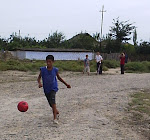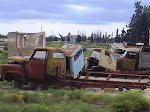I understand how her hands move in the steam, how she cuts the potatoes to boil and later mash, but just barely the words she speaks.
Muzaffar, on the other hand, who is trilingual, has his tiny paws wrapped around my ankle. He bites at my flip-flop. “Does Muzaffar want some piroshkies?” I hang my arms so he jumps to nibble at the tips of my fingers.
My host mother rolls her eyes and lures me to her cutting board. “Gal, Sasha, gal.” In the damp outdoor kitchen she demonstrates that with this knife she will cut and these onions to add the kartof that’s boiling here. My eyes burn from a distance. I assume that she will add at least a kilo of butter to the mix.
Lala scoots around the front of the house, faster than our puppy. She jogs upstairs to grab a potholder. Unlike my host mother in Sumgait Lala has fewer children, enabling her to grind beef, soak goose for a salty soup base, pickle eggplant, tomato, cucumber and green pepper, and knead and bake three to five loaves of wheat bread before the sun sets on the west side of the Kur. Then she hems pants. I don’t know for whom, but they’re all men’s pants, and it happens a lot.
She returns to slice three onions and slides them into the boiling grease on the gas stove. Using her wrist she brushes back her bangs to her gaudy gold and black patterned clip. They fall back to her almond eyes. I’ve never seen her thick strands flow to compliment her soft cheeks.
Back from the top kitchen, Lala calls. We are to roll out the hardening dough rising in the white vat. It reminds me of the playdough my mother would knead so she could read in her room, without three rugrats. Up top and bending down she pulled ingredients from the pantry: flour, water and a little bit of baking soda to hold the dough together. And they were magic, the tiny bottles of food coloring she handed us so we could dye our creation as well as our fingers.
I watch Lala as the dough sways in her hands, quickly yet elegantly into a sphere. My first try looks swollen and somehow discolored, like the roads that pave my village. Lala smears oil onto my palms so the dough will smooth out; it doesn’t, but Lala doesn’t mind. We make 60 medium- to large-sized balls.
Xanam, my host sister, is seated on her bed perpendicular to the stove. “My mother needs your help today. She is very busy. She must make piroshkies before five then prepare dinner. Then she must sew pants.” Over the sewing machine is draped trousers and white lining.
Lala bounces downstairs, and up again with the pot that has been drained. She hands me the potato masher, a kind that I’ve never used in the United States. I smash away. Sneaking a bite every few minutes, Lala turns for my opinion. “Yaxshi,” I nod. Dipping her index finger, she adds a dash of salt and tries it again. “Indi, yaxshi,” she says. Facing the kitchen garden, we set the mashed potatoes on the uneven, cracked, cool, open window.
The phone rings. “I’m here, outside, Sasha.” Emil has brought me the 1,674-page 2003 English-Azerbaijani dictionary, and the zero-degree sleeping bag my host mother views the same way as she does my headlamp. Strange things come from America.
On the crumbling brick patio I learn that Emil is fasting and is to take a 14-day vacation in a week.
“Is there any thing you would like me to clarify with your host mother before I leave?”
I begin, “I go in my room at night not because I don’t like her family but because it’s too much.”
“Bashadushmadum, bashadushmadum,” she laughs.
“Every day it’s Azerbaijani culture, Azerbaijani school, the language barrier, Azerbaijani teaching, Azerbaijani neighbors and food... In America,” I pause because I know very well where I am, “we have a lot of alone time. We just grew up this way. It’s how we regroup.” I use the palms of my hands to mold my head into the sphere it should be.
As my mother and I switch roles, as Emil expresses my concerns, her wispy bangs fall to her smile and she nods.
Emil lets himself out the back door, and my host mother and I climb the stairs to the kitchen above. Silence fills the room like smoke from burning dough.
She demonstrates how to flatten the dough and pull the sides into a petite oval shape. While I work on form she mixes the browned onions with the potatoes. The leaven is thick, three quarters of an inch, rising to the ceiling. We take turns flattening and stretching, spooning into the dough the cool potato filling. We fold one side over, rolling our thumb hard to lock the potato in. Like a wet cloth we fold it over again and flip it on its back. We do this 30 times instead of 60, since Emil is fasting. We lay them across the table in rows. In red they would look like juicy fruit rollups.
Near completion Lala moves soft strings of hair from above her brow. She lights the stove by match and fills the pan a quarter-inch thick with sunflower oil.
With tongs she places, one, two, three piroshkies onto the grill. “Sasha, gal.” She lets me take control, and warns me when the smoke melodramatically dances from the pan.
“Jeez, Bagishlayam.”
“Problem yoxdur!” she laughs.
I burn a few but the edible ones are heavy, like bread sticks, not like the grease-encrusted piroshkies fried by street vendors in Sumgait. With this measurable difference I consume four in one sitting. This is more bread than I usually eat in a week.
We do not make the spicy red sauce, but I suspect it’s because a bit of pepper with a meal has my family scrunching their face and shoving bread to their tongue.
In the morning, however, my sister sets three piroshkies on top of the chocolate wafers and vanilla circus biscuits. A tinge of fig murabba with piroshkie sets it apart from the ubiquitous boiled egg and bread and butter breakfast.
My mother tells my host father and sister that I had made the piroshkies. If only they understood how the dough, every day, truly rises.
Self-published in the Azlander, Vol. 4, isuue 4
Subscribe to:
Post Comments (Atom)


















































No comments:
Post a Comment